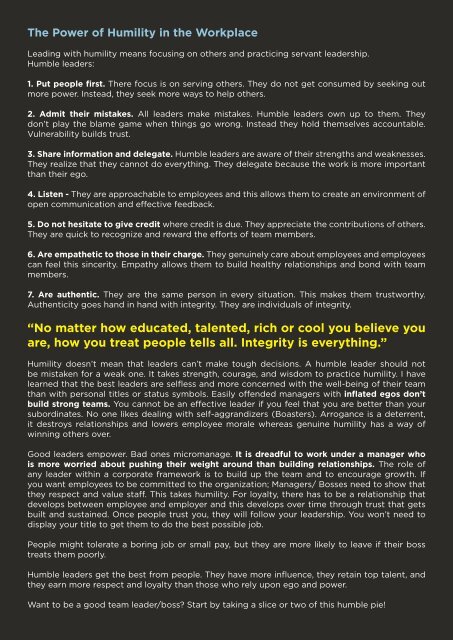TAXMAN
Create successful ePaper yourself
Turn your PDF publications into a flip-book with our unique Google optimized e-Paper software.
The Power of Humility in the Workplace<br />
Leading with humility means focusing on others and practicing servant leadership.<br />
Humble leaders:<br />
1. Put people first. There focus is on serving others. They do not get consumed by seeking out<br />
more power. Instead, they seek more ways to help others.<br />
2. Admit their mistakes. All leaders make mistakes. Humble leaders own up to them. They<br />
don’t play the blame game when things go wrong. Instead they hold themselves accountable.<br />
Vulnerability builds trust.<br />
3. Share information and delegate. Humble leaders are aware of their strengths and weaknesses.<br />
They realize that they cannot do everything. They delegate because the work is more important<br />
than their ego.<br />
4. Listen - They are approachable to employees and this allows them to create an environment of<br />
open communication and effective feedback.<br />
5. Do not hesitate to give credit where credit is due. They appreciate the contributions of others.<br />
They are quick to recognize and reward the efforts of team members.<br />
6. Are empathetic to those in their charge. They genuinely care about employees and employees<br />
can feel this sincerity. Empathy allows them to build healthy relationships and bond with team<br />
members.<br />
7. Are authentic. They are the same person in every situation. This makes them trustworthy.<br />
Authenticity goes hand in hand with integrity. They are individuals of integrity.<br />
“No matter how educated, talented, rich or cool you believe you<br />
are, how you treat people tells all. Integrity is everything.”<br />
Humility doesn’t mean that leaders can’t make tough decisions. A humble leader should not<br />
be mistaken for a weak one. It takes strength, courage, and wisdom to practice humility. I have<br />
learned that the best leaders are selfless and more concerned with the well-being of their team<br />
than with personal titles or status symbols. Easily offended managers with inflated egos don’t<br />
build strong teams. You cannot be an effective leader if you feel that you are better than your<br />
subordinates. No one likes dealing with self-aggrandizers (Boasters). Arrogance is a deterrent,<br />
it destroys relationships and lowers employee morale whereas genuine humility has a way of<br />
winning others over.<br />
Good leaders empower. Bad ones micromanage. It is dreadful to work under a manager who<br />
is more worried about pushing their weight around than building relationships. The role of<br />
any leader within a corporate framework is to build up the team and to encourage growth. If<br />
you want employees to be committed to the organization; Managers/ Bosses need to show that<br />
they respect and value staff. This takes humility. For loyalty, there has to be a relationship that<br />
develops between employee and employer and this develops over time through trust that gets<br />
built and sustained. Once people trust you, they will follow your leadership. You won’t need to<br />
display your title to get them to do the best possible job.<br />
People might tolerate a boring job or small pay, but they are more likely to leave if their boss<br />
treats them poorly.<br />
Humble leaders get the best from people. They have more influence, they retain top talent, and<br />
they earn more respect and loyalty than those who rely upon ego and power.<br />
Want to be a good team leader/boss? Start by taking a slice or two of this humble pie!<br />
25


